
Driving the news
- Taiwan’s defence ministry’s annual threat assessment report, sent to lawmakers on Friday, highlights that China continues to refine its military capabilities, including joint command operations.
- However, the report also notes that “the use of tactics and strategies against Taiwan is still limited by the natural geographical environment of the Taiwan Strait and insufficient landing equipment and logistic capabilities.”
- It further said that China “is not yet fully possessed of the formal combat capabilities for a comprehensive invasion of Taiwan.”
- The ministry’s report reveals that China is rapidly developing new weapons, such as the H-20 bomber and hypersonic missiles, while also increasing its nuclear warhead stockpile and testing new tactics.
- During the war games conducted by China around Taiwan in May, shortly after Lai Ching-te assumed office as the new president, Chinese coast guard ships were deployed for the first time to conduct interception and inspection drills off the east coast.
- The ministry suggests that China’s objective with these drills was to practice isolating Taiwan from the outside world and blockading the island, with the option of boarding foreign cargo ships as a potential action short of open conflict.
Why it matters
- China may not have the capability to “fully” invade but its potential to impose a blockade on the island nation has become a focal point of concern as tensions rise across the Taiwan Strait.
- This strategy, which would aim to cut off Taiwan from the outside world, is increasingly seen as a realistic scenario given China’s growing military power and assertive stance on Taiwan.
- A blockade of Taiwan would have far-reaching implications beyond the immediate military conflict.
- Taiwan is a global leader in semiconductor production, supplying vital components for everything from smartphones to advanced weapons systems. Disruptions in this supply chain would severely impact global industries, leading to economic shocks worldwide.
- Taiwan’s heavy reliance on imports—97% of its energy and 70% of its food—makes it particularly vulnerable, according to report from Centre for Strategic and International Studies(CSIS).
- Additionally, such an action could force the US and its allies into a dilemma: whether to engage militarily, risking a larger war with China, or to impose sanctions, which could hurt their own economies and global stability.
The blockade scenario
- The CSIS report outlines three main scenarios for how China might execute a blockade:
- All-out kinetic blockade: This scenario involves comprehensive military operations aimed at crippling Taiwan’s defenses and establishing control over key domains. It includes missile strikes and the establishment of a blockade with subsequent offers for negotiations.
- Mining blockade: A less aggressive approach that involves laying mines around Taiwan’s ports while conducting live-fire exercises to intimidate. This scenario aims to limit international backlash by not fully sealing off the Taiwan Strait.
- Limited blockade: The least kinetic option, which avoids mining and focuses on enforcing air and maritime exclusion zones. This scenario seeks to minimize escalation while still applying pressure on Taiwan.
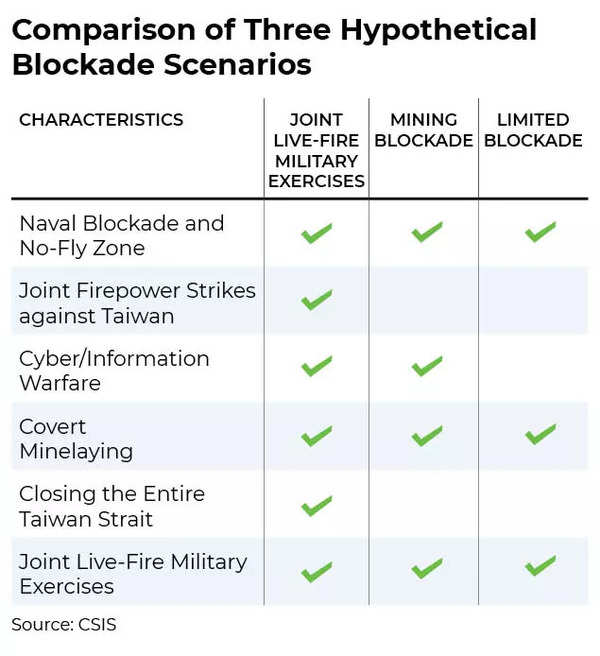
The big picture
China’s blockade strategy would likely employ a mix of naval forces, air patrols, and advanced missile systems to create a de facto quarantine around Taiwan.
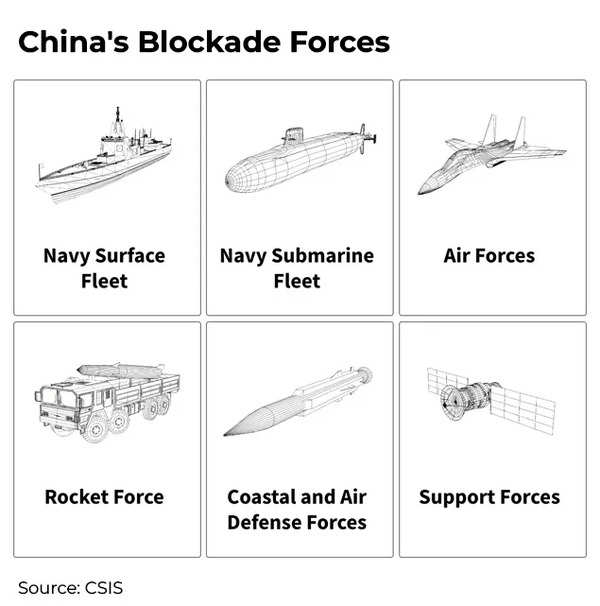
The goal would be to pressure Taiwan into political concessions without a full-scale invasion, which would be far more costly and dangerous for Beijing. However, the strategy carries significant risks.
Any misstep could provoke a military response from Taiwan, backed by the US and other regional powers like Japan and Australia, potentially escalating into a broader conflict.
Cyber warfare would also play a crucial role, with China potentially targeting Taiwan’s critical infrastructure, communications, and financial systems to cripple its ability to resist. The blockade would test the resolve of the international community, particularly the US, which has longstanding commitments to Taiwan’s defense under the Taiwan Relations Act.
Will China, US to go war over Taiwan?
As per a Time report, the term “Thucydides Trap” is frequently employed to characterize the tense relationship between the United States and China, as well as the potential consequences of this friction. However, the inevitability of armed conflict remains a topic of intense debate among experts.
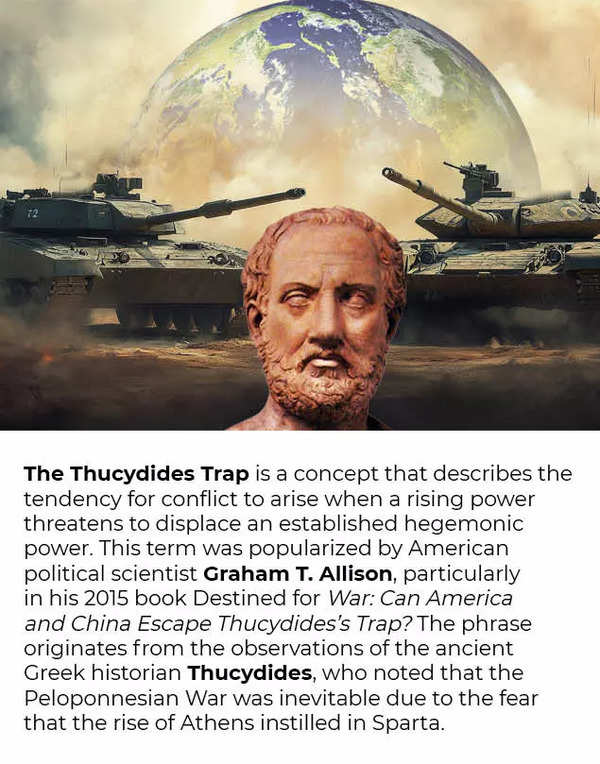
In a 2023 memo, a top US air force official predicted that America and China may go to war in 2025. “I hope I am wrong. My gut tells me we will fight in 2025. Xi secured his third term and set his war council in October 2022. Taiwan’s presidential elections are in 2024 and will offer Xi a reason. United States’ presidential elections are in 2024 and will offer Xi a distracted America. Xi’s team, reason, and opportunity are all aligned for 2025,” four-star general Mike Minihan warned his troops.
The belief that a confrontation between the United States and China over Taiwan is inevitable is becoming increasingly prevalent, as evidenced by recent statements from high-ranking US military officials. General Mike Minihan’s memo, which warned of a potential Chinese invasion of Taiwan by 2025, is just the latest example of this growing concern. Similarly, former US Indo-Pacific Command chief Philip Davidson recently reaffirmed his earlier prediction that China may attack the self-governing island by 2027.
What if US and China really went to war over Taiwan and it goes nuclear? Who is likley to come out as a winner? Read this report to find out.
What they’re saying
- Military analysts caution that while a blockade might seem like a less aggressive option compared to an invasion, it could be just as effective in coercing Taiwan into submission.
- “A blockade could be a slow but steady stranglehold, gradually wearing down Taiwan’s economy and morale,” says one expert. Another adds, “The international community would be under enormous pressure to respond, but doing so without escalating the conflict would be incredibly challenging.”
- China’s defence ministry says that as long as Taiwan’s ruling Democratic Progressive Party “engages in ‘Taiwan independence’ (efforts), there will be no peace”.
- “The more they provoke, the faster they will perish,” Chinese spokesperson Wu Qian told reporters in Beijing.
What’s next
- China is frequently sending warplanes and warships near Taiwan in an effort to intimidate its citizens and weaken the island’s defenses.
- In response, Taiwan has taken various measures, including extending the period of national military service to one year, developing its own submarines, and importing advanced equipment from the United States.
- The vast majority of Taiwanese support the current status of de-facto independence for their island, which has been separate from mainland China since the civil war in 1949.
- In response to this growing threat, the US and its allies have been increasing their military presence in the Indo-Pacific region, conducting joint exercises, and enhancing their defense alliances. These actions are intended to deter China from considering a blockade or any other aggressive move against Taiwan.
- Diplomatic efforts are also intensifying, with leaders urging Beijing to seek peaceful resolutions and warning of the severe consequences of military action.
- Taiwan President Lai Ching-te, whom China calls a “separatist”, has repeatedly offered talks with Beijing, but has been rebuffed. He says only Taiwan’s people can decide their future.
- “Peace achieved by strength is true peace. “We will continue to improve our self-defence capabilities and show the world that we are united as a nation and are determined to protect our country,” Lai said.
(With inputs from agencies)
Here is Thucydides imagined through AI in the modern world:
1. An AI image of Thucydides standing in a modern, war-torn Ukraine, blending ancient history with contemporary conflict.
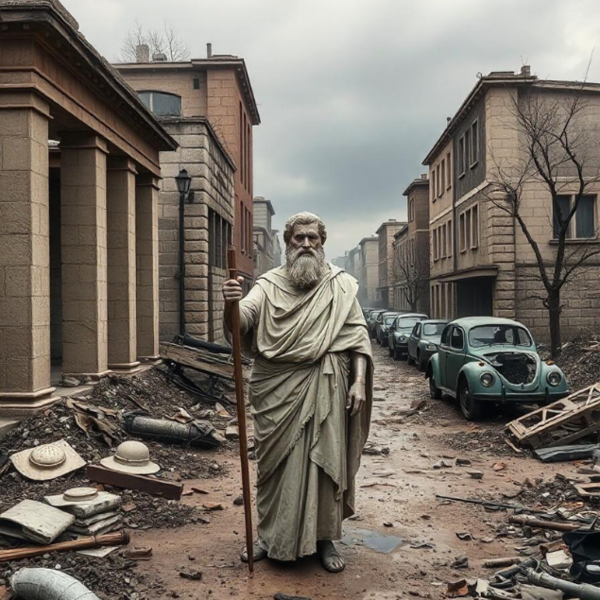
Image credit: freepik
2. An AI image of the Peloponnesian War
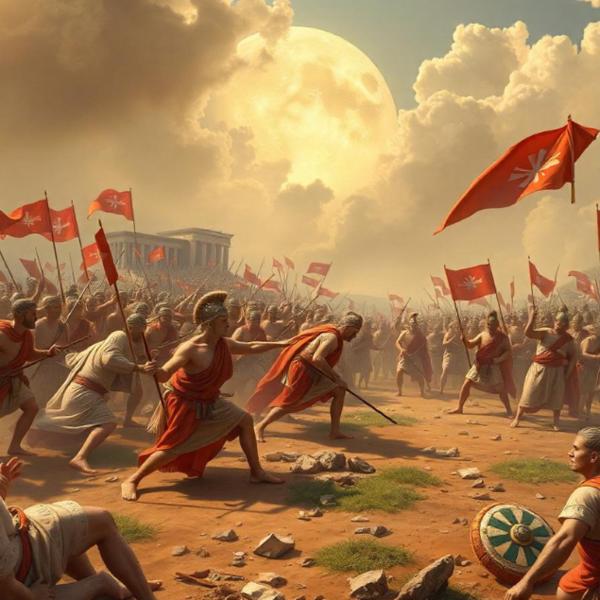
Image credit: freepik
3. Thucydides imagined through AI in modern democratic assembly, perhaps the UN or a national parliament
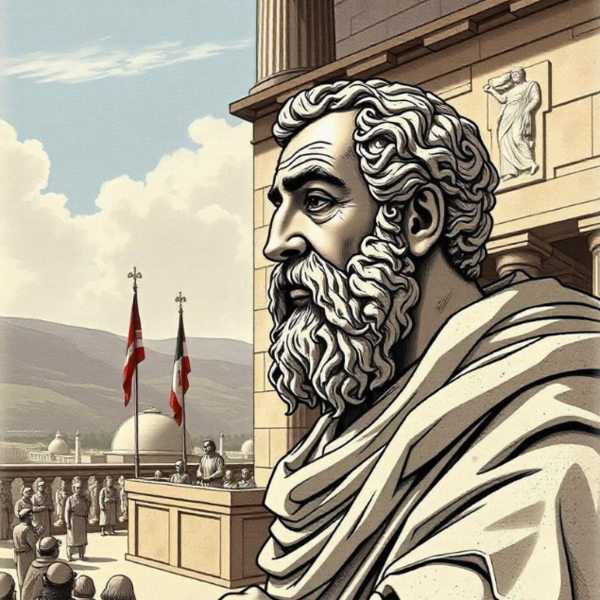
Image credit: freepik
4. Thucydides looking at holographic projections of global data networks, AI-driven decision-making systems, and digital avatars of world leaders, merging classical philosophical thought with modern technological ethics.
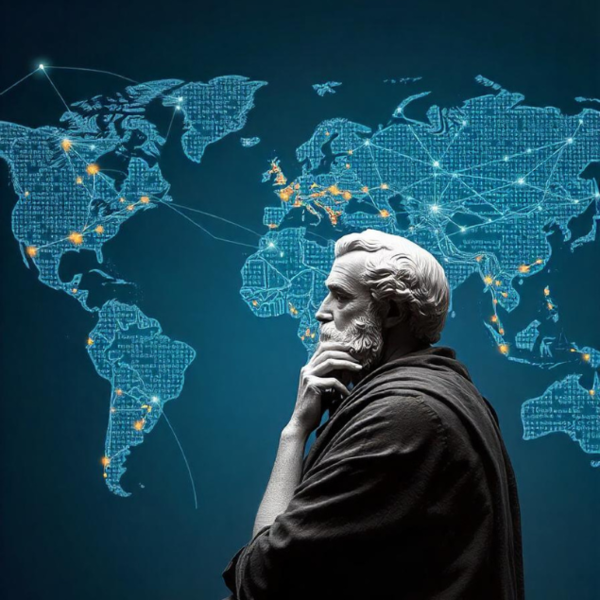
Image credit: freepik




